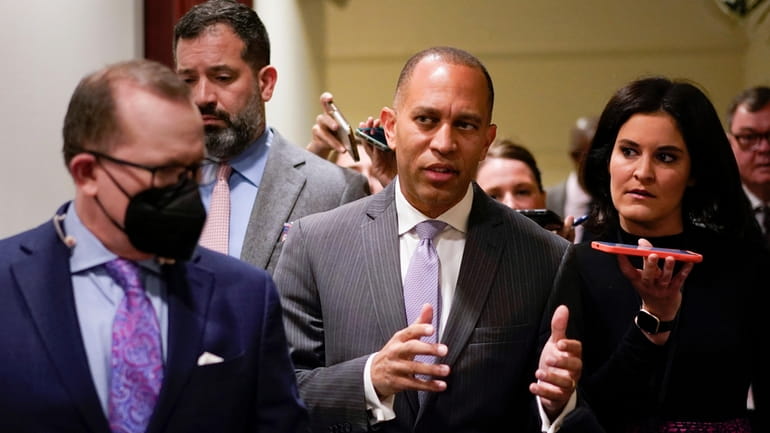Brooklyn is in the House: Jeffries poised to become next Dem leader

The clout of Democratic Rep. Hakeem Jeffries, seen talking with reporters on Capitol Hill in Washington, depends strictly on the support of other incumbents of his party. Credit: AP/Carolyn Kaster
Hakeem Sekou Jeffries of Brooklyn, poised to become the next leader of Democrats in the U.S. House of Representatives, cannot bet on basking in nationwide popularity any more than those who preceded him.
Mellow is not in the job description. Only one district, of 435 nationwide, sends him to Washington. His clout at the Capitol depends strictly on the support of other incumbents of his party. This parochial fact of political life gets overlooked when polls show legislative leaders to be unpopular among the bipartisan national electorate.
Whether in the majority or minority, conference leadership rests on fragile coalitions, deals, pressure, and prodding. That’s what formed the up-and-down career arcs of leaders Nancy Pelosi, Kevin McCarthy, Mitch McConnell, Chuck Schumer, Paul Ryan, and John Boehner. All became symbolic targets in campaigns nationwide by the opposing party.
To maintain power, legislative leaders get their hands dirty compromising with potentially rival figures, many with egos as big as their own.
New York politicos say Jeffries’ persona fits the role. At 52, he shows a survivor’s discipline in what he says to others, and a feel for the pragmatic — but also a hungry edge honed in the Thunderdome of Brooklyn primary elections.
His 8th Congressional District includes enclaves of African Americans, Caribbean Americans, Hispanics, Orthodox Jews, Russians, and Asians. To get where he is now, Jeffries years ago bucked the plans and ambitions of 30-year ex-Rep. Ed Towns, ex-Assemb. Roger Green, and former state assemblyman and New York City Councilman Charles Barron.
This year, after fumbling the redistricting process, leading to a rewrite in court, state Democrats lost four of their congressional seats to Republicans, which helped the GOP recoup a majority on Election Day. Despite that home-state embarrassment, he's remained on track to succeed Pelosi.
That's ironic because Jeffries found himself on the losing end of hyperpartisan Assembly redistricting in 2004. That year, Green quit his seat after pleading guilty to petty larceny involving false travel reimbursements. Green was fined and given probation but then ran again for a new term — and won.
How did it happen? Jeffries, then a corporate lawyer, had been ready to challenge Green — for a third time — in a primary. But the chamber’s Democratic leadership wrote Jeffries’ home out of the district. "The district was cut out by just that one block," Jeffries fumed at the time.
Jeffries finally reached the Assembly when Green challenged Towns for Congress in 2006 and lost. Six years later, with Towns retiring, Jeffries fought a hard primary against Barron, whom Towns backed to succeed him. One Barron-Jeffries debate focused on who'd make a better ally for President Barack Obama in Congress; Jeffries won.
In recent years, as a leader-in-waiting, Jeffries traveled the national campaign circuit. In May, he stumped in Iowa for two-term Rep. Cindy Axne. "I gotta be honest with ya," Jeffries said at a rally covered by C-SPAN. "Most of the time [in Washington] we use the phrase 'my very good friend' we don't mean it, y'all. But with Cindy Axne I absolutely mean it."
This month, Axne lost 50.3% to 49.7%, a mere 2,000 votes, to Republican Zach Nunn. So in 2024, the battle-scarred Jeffries will seek to win the seat back — and enough others to make him speaker.
Columnist Dan Janison's opinions are his own.

